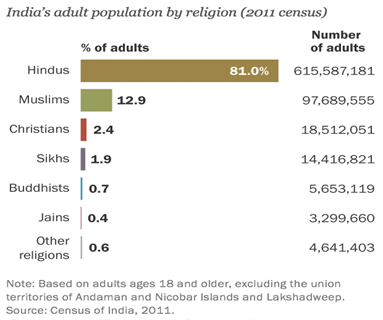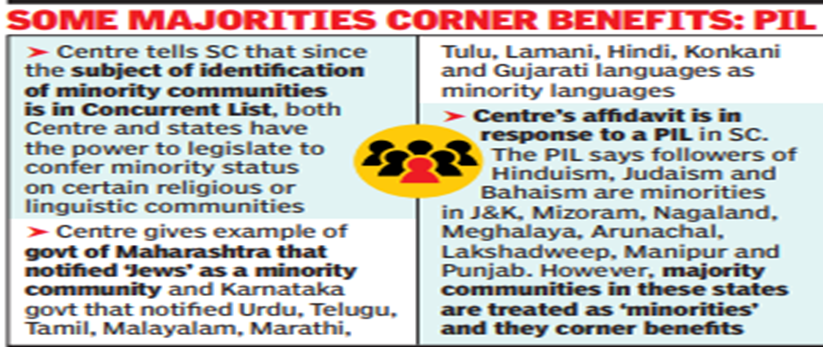In News:
- Recently, the Supreme Court (SC) of India expressed displeasure with the Centre's changing stance on the issue of minority tag to Hindus in certain states and union territories, allowing extra time for talks with states.
- While the Centre had sought to transfer the onus of giving minority status to states, claiming that they too have concurrent powers to do so, the fresh affidavit filed recently stated that the right to notify minorities is vested with the Centre.
What’s in today’s news article:
- Identification of Minorities in India (Definition by the UN, legal basis, constitutional basis, SC’s take on this)
- News Summary (Background, Union government’s recent response)
Identification of Minorities in India:

- Minorities as defined by the UN: Any group or community which is socially, politically and economically non-dominant and inferior in population are minorities.
- Legal basis of identification in India:
- In India, section 2(c) of the National Commission for Minority (NCM) Act 1992, does not define the term minorities but says that the central government will notify who are minorities.
- As a result, the central government has notified 6 communities - Muslims, Sikhs, Buddhist, Parsis, Christians and Jains (added in 2014) as minorities (till date) on the basis of their population at national level.
- Under Section 2(f) of the National Commission for Minority Educational Institutions Act, 2004 ‘minority’ means a community notified as such by the Central government
- Constitutional basis of identification in India:
- The Constitution of India mentioned the term ‘minority’ only on two occasions in Article 29 and Article 30 but it nowhere defines the term.
- Hence, it was left at the discretion of the central government to determine what constitutes minorities.
- Types of minorities in India: Article 30 of the Indian Constitution gives the right to a linguistic or religious minority of a State to establish and administer educational institutions of their choice.
- Concurrent List of the India Constitution: Article 246 of the constitution read with Entry 20, ‘Economic planning and social planning’, of the concurrent list of 7th schedule gives both the Centre and the states power to legislate to confer minority status on certain religious or linguistic communities
- Article 350-B: The 7th Constitutional (Amendment) Act 1956 inserted this article which provides for a Special Officer for Linguistic Minorities appointed by the President of India. It would be the duty of the Special Officer to investigate all matters relating to the safeguards provided for linguistic minorities under the Constitution.
- SC on identification of minorities in India: In T.M.A Pai Foundation vs. State of Karnataka (2002), the court held that the unit of determining religious and linguistic minority would be 'State'.
- Bal Patil Case (2005): SC in its judgement in ‘Bal Patil’ referred to the TMA Pai ruling. The legal position clarifies that henceforth the unit for determining status of both linguistic and religious minorities would be ‘state’
News Summary:
- Background:
- A public interest litigation (PIL) has been filed before the SC to declare Hindus as minorities in 8 states/UTs in India as they constitute a numerical minority in these states (as per Census 2011 data).
- These states/UTs are Lakshadweep, Nagaland, Mizoram, Meghalaya, Arunachal Pradesh, Manipur, Punjab and Jammu & Kashmir.
- Hindus are minorities in these states, but are not designated so, excluding them from Union Government programmes such as 20,000 scholarships for minority students pursuing technical education.
- The SC then asked the petitioner to approach the NCM which said that it does not have the jurisdiction in this matter and under Section 2(c) of the NCM Act, only the Centre can declare a community as a ‘minority’.
- The plea also challenges the Centre’s powers under the NCM Act, 1992, to notify minorities.
- In this matter, the SC has asked for the response of the central government.
- Union government’s response (in an affidavit filed on March 25):

- Union government’s recent response (New affidavit filed on May 9):
- The fresh affidavit filed recently stated that the right to notify minorities is vested with the Centre.
- The Ministry of Minority Affairs said that matter has far-reaching ramifications and needed more time for discussions with state governments and other stakeholders.
- The SC bench allowed the Centre’s request for time to carry out the discussions.










